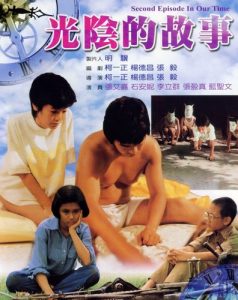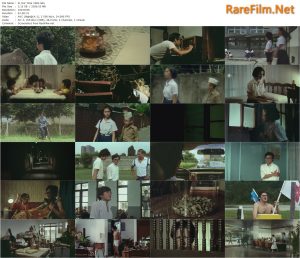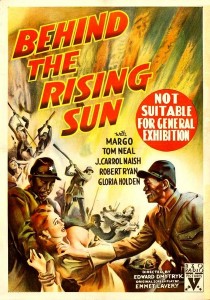
Four short films from four different directors, spanning from the 1950s to the 1980s.
Four stories, filmed by four different directors, all newcomers and mostly trained in film schools abroad where they picked up new ideas about cinema quite divergent from those of their Taiwanese elders. Each story is set in a different decade, moving forward chronologically (1950s, ’60s, ’70s, ’80s) and with protagonists of increasing ages as time goes on (a boy of about 8, a young teenage girl, a university student, a married couple moving into their own flat for the first time). Thus goes the basic premise of In Our Time, but as with all omnibus films, not all parts are as strong as the others. In this case, the first two episodes are the most impressive and satisfying.
The opener is ‘Little Dragonhead’, directed by Tao Te-chen, and centred around young Hsiao-mien, a loner kid, neglected by uncaring parents who seemingly prefer his brother, picked on at school, and whose only friend (and comfort blanket) is his beloved toy dinosaur. Essentially all the stakes are stacked in his favour to make us root for this boy, all the more so as the perspective is limited to his point-of-view and we, unlike the uncomprehending adults, get a glimpse into his inner world, which he’s often forced to escape to. We’re also in the privileged position of being able to recognise his artistic talent, whereas the adults around him mistakenly attribute his crayon portrait of his dinosaur to another child, and in any case they’ve had it up to here with his dinosaur obsession.
Things finally look up when he strikes a sweet friendship with the daughter of a neighbour, until irony strikes and adult matters get in the way: these neighbours are moving abroad permanently the next day and Hsiao-mien only realises at the very end that this was a farewell visit. True to its logic of being told from a boy’s viewpoint, we only find out when he does, setting the limits of what a child can know in an adult’s world.
What impresses most, alongside the intelligent performances induced from the children, is the nostalgic atmosphere conjured up by Tao. The 1950s setting is important, just like the 1960s one shall be in Yang’s segment, for both directors were making films about children set in the period of their own childhood. Wistful memories thus colour the mood, the dreamy dissolve-laden editing, and especially the music. All along Hsiao-mien’s tale is a period soundtrack, of 1950s pop, both Chinese and Western, most catchily the twangy guitar of Santo & Johnny’s instrumental 1959 classic Sleep Walk. It’s the kind of sound which would be at home in a Wong Kar-wai soundtrack, casting young Hsiao-mien as one of Wong’s romantic jilted-loner protagonists, before they even existed.
No less atmospheric or languid is ‘Expectations’, Edward Yang’s section. Even more dissolves, fades-to-black punctuating scenes, soft hazy lighting, classical music on the soundtrack, the Beatles and the Vietnam war on TV, once again the sense of dreamy nostalgia is created through editing, image and sound. So often in coming-of-age stories it is young boys facing their rites of passage, so Yang’s exquisitely delicate treatment of teenage girl Hsiao-fen’s adolescent amorous awakenings is particularly refreshing.
It all kicks off when a new tenant, handsome, young, and male, moves into the spare room of the home Hsiao-fen lives in with her mother and older sister. Shortly, the lodger becomes the target of our protagonist’s secretly blossoming crush, and an ocean of previously unknown feelings is opened up to Hsiao-fen. She no longer has time to go play with her best school-friend, a short bespectacled boy. The internal reveries she loses herself in are rendered with sensitive economy by Yang through both sound and purely visual film-making.
One inconspicuous pan, from Hsiao-fen to her sister at the dinner table, sets up a later, far more crucial, identical camera movement. It occurs at the end of one of the most striking sequences in this short, a dissolve-montage of Hsiao-fen eyeing up the young male tenant topless on the front porch, his athletic body fetishised by the camera’s female gaze (uncommon in a medium which has so often personified the male viewer) which blends every slow shot of the boy into the next, only interrupting this stream to cut-in to a shot of a rapt, wide-eyed Hsiao-fen. But the final shot, in one brief pan, reveals that all along Hsiao-Fen’s sister was there too, sharing the view and she, being older, is far more likely to have a shot with the handsome tenant. What we thought was purely Hsiao-fen’s fantasy daydream, has been partially usurped by her own sister, setting up a triangular relationship that defines Hsiao-fen’s learning curve in this film. She’ll realise how mean she was to her little school-friend and make amends, but nonetheless something within her can never be the same again.
The third story, Ko I-Cheng’s ‘Leapfrog’, ushers in a sharp change of mood. The dreamy atmosphere is replaced by comic chattiness from the get-go, when our student protagonist, ‘Fatty’, playfully introduces himself to us narrating over shots of he and his university cohorts. No, he’s not the slightly chubby one in the middle as his nickname might lead us to assume, he chimes, but the skinny one on the edge of the frame, that’s him. Because Fatty is now a dedicated member of the college biathlon team (hence the amphibian reference of the title) and has shed all traces of his former overweightness.
This is a young man with more than a passing resemblance to Benjamin in The Graduate. He has a restless sense of energy but no clear outlet for it, other than the upcoming biathlon race. He’s alienated from his businessman father who doesn’t quite understand him or why he wants to change his major to literature. He’s awkward, especially, and to his great frustration, around the opposite sex, but his inner monologues (while shyly glimpsing a pretty girl in a lift) reveal he’s a wannabe poet, reciting romantic lines in his head which he’d never have the audacity to actually utter. The dreamy dissolves and fades of the first two parts are replaced with a more conventional editing rhythm, their nostalgic mood into a rather odd allegory culminating with the biathlon race, where Fatty challenges a team of foreign students from the US… is this a commentary on Taiwan seeking to break free from its status as satellite? On its national pride? On a narrative level this is the most confused of the four, but plenty of scenes getting us to know Fatty reveal assured film-making touches.
Part four, the least introspective and least concerned with romantic impulses, enters into even broader comedy territory, with a healthy dose of satire. Chang Yi’s ‘Say Your Name’ now has a young married couple as its central characters. They’ve just moved into a new apartment in the city and their first day reserves madcap situations aplenty; the wife forgets her name badge on her first day at work and is refused entry into her building (a literal identity crisis) while the husband, who stayed home. gets locked out when trying to retrieve his newspaper from the letterbox, wearing nothing more than a towel. Efforts to seek help from bemused, suspicious neighbours, or uncaring commuters in the street, leave him as frustrated as his wife is by locking horns against a bureaucratic wall. Adulthood and city living have their own shares of problems, life doesn’t get any simpler after the rites of passage of childhood and adolescence we witnessed in the previous parts, but if the film’s increasingly comic structure is anything to go by, maybe we become better at laughing it off.
In Our Time and its chronological coming-of-age structure (of its characters, of Taiwan growing into the urbanised island of the final episode, and of Taiwanese cinema itself) did win back Taiwanese audiences, at least momentarily, thanks to its novelty factor; an on-screen reflection so close to their own lives and experiences was a first for Taiwanese cinema. The Taiwanese New Wave, which it nudged into life, would go on to bigger, better things, pairing its earthy realist concerns with a radical long-take, long-shot aesthetic. From our vantage point, naturally, this film seems most noteworthy for announcing Edward Yang’s talent to the world, but as a whole, despite its unevenness, it is rich with promise and more than a little charm in its four different slices of Taiwanese eras. The highlights, ‘Expectations’ and ‘Little Dragonhead’, certainly belong alongside the best films about children 1980s world cinema had to offer.
File Name : In Our Time 1982.mkv
File Size : 2.15 GB / 2206.55 MB
Resolution : 1024×528
Duration : 01:50:31
Quality: BRRip
Language: Mandarin
Subs: English, Chinese (embedded)
Country: Taiwan
Genres: Drama























































